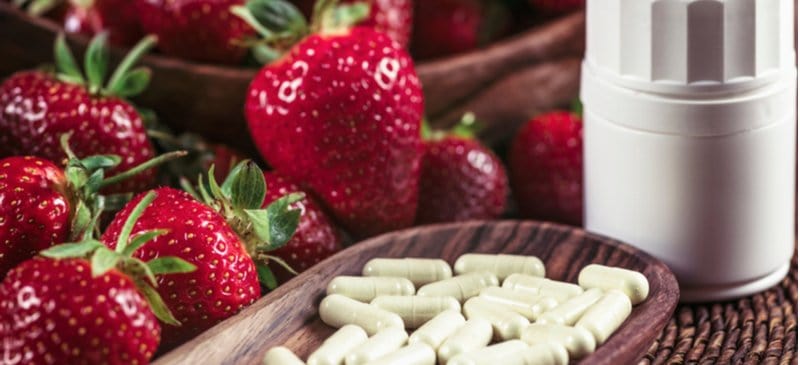This Dr. Axe content is medically reviewed or fact checked to ensure factually accurate information.
With strict editorial sourcing guidelines, we only link to academic research institutions, reputable media sites and, when research is available, medically peer-reviewed studies. Note that the numbers in parentheses (1, 2, etc.) are clickable links to these studies.
The information in our articles is NOT intended to replace a one-on-one relationship with a qualified health care professional and is not intended as medical advice.
This article is based on scientific evidence, written by experts and fact checked by our trained editorial staff. Note that the numbers in parentheses (1, 2, etc.) are clickable links to medically peer-reviewed studies.
Our team includes licensed nutritionists and dietitians, certified health education specialists, as well as certified strength and conditioning specialists, personal trainers and corrective exercise specialists. Our team aims to be not only thorough with its research, but also objective and unbiased.
The information in our articles is NOT intended to replace a one-on-one relationship with a qualified health care professional and is not intended as medical advice.
Fisetin: A Senolytic Antioxidant for Healthy Aging & More
September 26, 2020

Fisetin is a flavonoid that’s found in strawberries and other fruits and vegetables. Recent research suggests that the antioxidant has potent senolytic activity that may work to prevent the replication of damaged DNA.
This means that fisetin supports healthy aging and fights chronic disease — so if you needed an excuse to snack on strawberries every day, here it is!
As a fat-soluble antioxidant, it can be safely consumed in a smoothie with strawberries and coconut milk, for instance.
Want to learn more about this health-promoting plant pigment? You’ll be impressed by its potential.
What Is Fisetin?
Fisetin is an antioxidant that’s found in fruits and vegetables, including strawberries, apples and cucumbers. According to research published in Frontiers in Chemistry, the flavonoid shows “potential as an anti-inflammatory, chemopreventive, chemotherapeutic and senotherapeutic agent.”
It’s getting a lot of attention because of its senolytic properties. A senolytic is a class of small molecules that are able to induce death of senescent (or deteriorating) cells and promote human health.
Fisetin Foods
Fisetin is a yellow plant pigment and chemical that’s found naturally in foods, especially fruits and vegetables. You consume the antioxidant when eating the following foods:
- strawberries
- apples
- persimmons
- grapes
- onions
- cucumbers
- kiwi
- kale
- peach
- lotus root
- mangoes
Benefits/Uses
1. Works as an Antioxidant
Research shows that fisetin has the ability to scavenge free radicals that have significant biological effects. These oxygen radicals can damage lipids, amino acids, carbohydrates and nucleic acids.
When we don’t consume enough antioxidant foods, there’s an imbalance of oxygen species that can inhibit the body’s ability to defend itself.
2. Has Senolytic Activity
Research published in The Lancet found that fisetin is a flavonoid with potent senolytic activity in both mice and human tissues. This means that the antioxidant works to prevent the replication of damaged DNA, potentially playing a role in aging and age-related diseases.
When researchers tested 10 flavonoids — including resveratrol, rutin, luteolin, curcumin and fisetin — they found that fisetin was the most potent senolytic.
3. Holds Anti-Cancer Properties
Data suggests that fisetin possesses antiproliferative properties against several cancers, which means that it may inhibit tumor cell growth. Researchers believe that it has potential value in cancer prevention and treatment, as it may reduce angiogenesis (the growth of new blood vessels) and suppress tumor growth.
4. Reduces Inflammation
If you’re looking to increase your consumption of anti-inflammatory foods, start reaching for those strawberries. Fisetin has proved to possess strong anti-inflammatory effects in cell culture and in animal models relevant to human diseases, according to research published in Advances in Experimental Medicine and Biology.
5. Promotes Healthy Aging
Because fisetin is a senotherapeutic, it may extend your health and life span. Research indicates that it promotes healthy aging by reducing oxidative stress and increasing glutathione levels, a major intracellular antioxidant.
It also reduces the production of pro-inflammatory molecules and activate key neurotrophic factor signaling pathways that support growth, survival and healthy aging.
6. Boosts Heart Health
Research shows that fisetin may help promote cardiovascular health in a number of ways.
One analysis reports that the antioxidant can induce cardiac regeneration by activating genes involved in cell proliferation. Researchers believe that it may protect from ischemic damage following a heart attack.
There’s some evidence that fisetin may help prevent stroke as well. An animal study found that fisetin, quercetin and aspirin showed significant prolongation of clotting time and thrombin time.
Supplement and Dosage
The amount of fisetin consumed in clinical trials vary greatly, with participants taking doses ranging from 100 milligrams per day to 1,400 milligrams daily. Recommendations on fisetin supplement labels vary as well, with doses ranging from 100–500 milligrams per day.
There isn’t enough research to make an educated recommendation on an appropriate fisetin dosage. Researchers do know that the antioxidant is fat-soluble, so consuming it with fats promotes better absorption.
Risks and Side Effects
The safety profile of fisetin in high doses is relatively unknown. Many studies involve cell cultures or animal tissues, while a limited number involve human tissues.
To boost your health with antioxidants, the safest method is eating fresh fruits and vegetables. Eating organic strawberries is the best way to increase your fisetin intake.
Conclusion
- Fisetin is a plant pigment and antioxidant that has gained attention because of its senolytic properties.
- The flavonoid is known for its ability to prevent the replication of damaged DNA, thereby reducing the risk of aging, degenerative disease, heart disease and cancer.
- It is found in fruits and vegetables like strawberries, cucumber, apples and onions. The antioxidant is also available in supplement form, but there is no recommended dosage, as there isn’t enough evidence to pinpoint how much is safe and effective.









